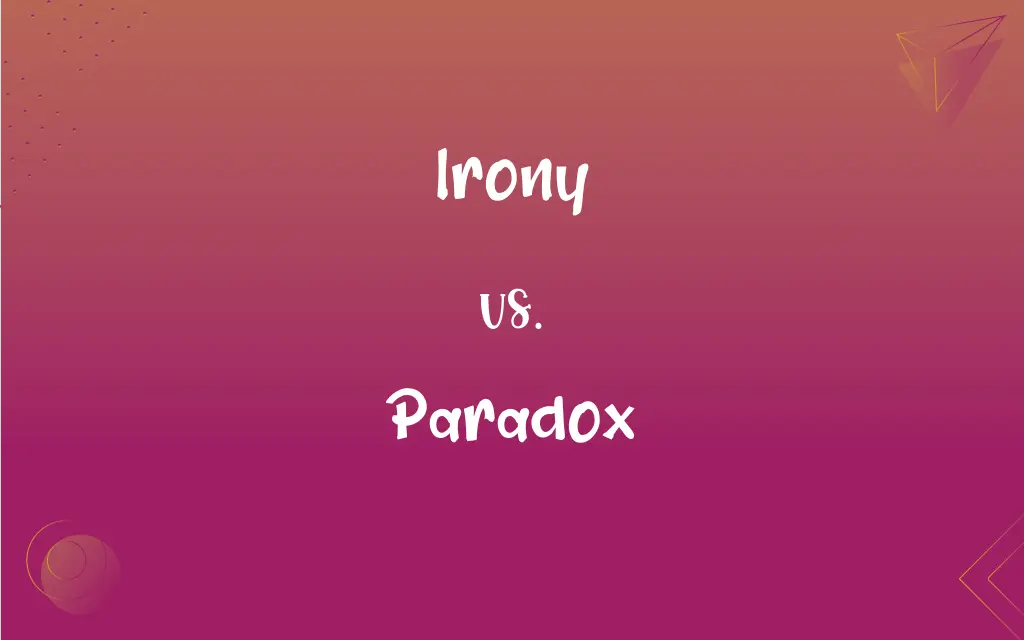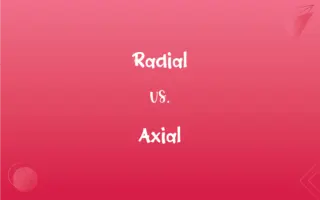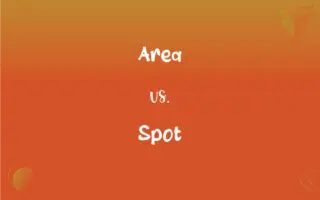Irony vs. Paradox: What's the Difference?
Edited by Aimie Carlson || By Janet White || Updated on October 5, 2023
Irony vs. Paradox: "Irony" denotes a difference between expectation and reality, while "Paradox" refers to a seemingly contradictory statement that reveals a truth.

Key Differences
"Irony" and "Paradox" are both literary devices used to convey complex meanings and insights, but they function distinctly. Irony highlights situations where there's a gap between what's expected and what actually happens, making readers or listeners reflect on the underlying meaning. Paradox, in contrast, presents an idea that seems contradictory or counterintuitive, yet upon deeper examination, it reveals an inherent truth.
Often, Irony operates at the level of situation, speech, or drama. For instance, a fire station burning down is situational irony because it defies expectations. Paradox, on the other hand, is primarily a statement or proposition, such as "less is more," challenging our conventional understanding.
The appreciation of Irony often hinges on shared knowledge or understanding. For the irony to be recognized, the audience must be aware of the contradiction between appearance and reality. Paradox, however, requires contemplation, as the audience unpacks the seeming contradiction to find the deeper truth.
While Irony often plays with expectations and can induce humor or sadness, depending on the context, Paradox aims to provoke thought. The essence of a paradox is its ability to force the reader or listener to step out of their comfort zone and consider an unconventional truth.
It's crucial not to confuse Irony with mere coincidence or bad luck. Irony always contains an element of unexpectedness that goes against norms or expectations. Paradox, despite its seemingly contradictory nature, always contains a kernel of truth, urging deeper understanding.
ADVERTISEMENT
Comparison Chart
Nature
Descriptive of situations/events
Descriptive of statements or ideas
Function
Contradiction between expectation and outcome
Statement that contradicts itself but reveals a truth
Audience's Role
Recognize the incongruity
Reflect and discern the hidden truth
Common Usage
In everyday situations, speech, literature
Primarily in literature, philosophy, and thought exercises
Emotional Impact
Can evoke humor, sadness, surprise
Evokes contemplation, challenges conventional wisdom
ADVERTISEMENT
Irony and Paradox Definitions
Irony
A rhetorical device emphasizing the opposite of what's stated.
How nice! she said, when it started to rain on the parade.*
Paradox
A truth existing through contradiction.
To be free, we must have limits is a paradox of societal structures.*
Irony
A situation highlighting the incongruity between appearance and substance.
The irony of the situation was that the vegetarian won the meat raffle.*
Paradox
A statement seemingly contradictory but expressing a truth.
The only constant is change is a well-known paradox.*
Irony
An outcome contrary to what was expected.
The irony was that the dog chased the cat, but the cat saved the dog from danger.*
Paradox
An idea that counters conventional beliefs but reveals insight.
Less is more is a design paradox many architects swear by.*
Irony
The use of words to express something different from and often opposite to their literal meaning.
Paradox
A proposition opposing itself yet conveys a deeper meaning.
The more you learn, the less you know is a paradox that speaks to endless knowledge.*
Irony
An expression or utterance marked by a deliberate contrast between apparent and intended meaning
"the embodiment of the waspish don, from his Oxbridge tweeds to the bone-dry ironies of his speech and prose" (Ron Rosenbaum).
Paradox
A statement that seems to contradict itself but may nonetheless be true
The paradox that standing is more tiring than walking.
Irony
Incongruity between what might be expected and what actually occurs
"Hyde noted the irony of Ireland's copying the nation she most hated" (Richard Kain).
Paradox
A person, thing, or situation that exhibits inexplicable or contradictory aspects
"The silence of midnight, to speak truly, though apparently a paradox, rung in my ears" (Mary Shelley).
Irony
An occurrence, result, or circumstance notable for such incongruity
The ironies of fate. See Usage Note at ironic.
Paradox
A statement that is self-contradictory or logically untenable, though based on a valid deduction from acceptable premises.
Irony
Dramatic irony.
Paradox
An apparently self-contradictory statement, which can only be true if it is false, and vice versa.
"This sentence is false" is a paradox.
Irony
Socratic irony.
Paradox
A counterintuitive conclusion or outcome.
It is an interesting paradox that drinking a lot of water can often make you feel thirsty.
Irony
(rhetoric) The quality of a statement that, when taken in context, may actually mean something different from, or the opposite of, what is written literally; the use of words expressing something other than their literal intention, often in a humorous context.
Paradox
A claim that two apparently contradictory ideas are true.
Not having a fashion is a fashion; that's a paradox.
Irony
(countable) An ironic statement.
Paradox
A thing involving contradictory yet interrelated elements that exist simultaneously and persist over time.
Irony
Dramatic irony: a theatrical effect in which the meaning of a situation, or some incongruity in the plot, is understood by the audience, but not by the characters in the play.
Paradox
A person or thing having contradictory properties.
He is a paradox; you would not expect him in that political party.
Irony
Socratic irony: ignorance feigned for the purpose of confounding or provoking an antagonist.
Paradox
An unanswerable question or difficult puzzle, particularly one which leads to a deeper truth.
Irony
(informal){{cite-journal
Paradox
(obsolete) A statement which is difficult to believe, or which goes against general belief.
Irony
Of or pertaining to the metal iron.
The food had an irony taste to it.
Paradox
(uncountable) The use of counterintuitive or contradictory statements (paradoxes) in speech or writing.
Irony
Made or consisting of iron; partaking of iron; iron; as, irony chains; irony particles; - In this sense iron is the more common term.
Paradox
A state in which one is logically compelled to contradict oneself.
Irony
Resembling iron in taste, hardness, or other physical property.
Paradox
The practice of giving instructions that are opposed to the therapist's actual intent, with the intention that the client will disobey or be unable to obey.
Irony
Dissimulation; ignorance feigned for the purpose of confounding or provoking an antagonist.
Paradox
A tenet or proposition contrary to received opinion; an assertion or sentiment seemingly contradictory, or opposed to common sense; that which in appearance or terms is absurd, but yet may be true in fact.
A gloss there is to color that paradox, and make it appear in show not to be altogether unreasonable.
This was sometime a paradox, but now the time gives it proof.
Irony
A sort of humor, ridicule, or light sarcasm, which adopts a mode of speech the meaning of which is contrary to the literal sense of the words.
Paradox
(logic) a self-contradiction;
`I always lie' is a paradox because if it is true it must be false
Irony
Witty language used to convey insults or scorn;
He used sarcasm to upset his opponent
Irony is wasted on the stupid
Satire is a sort of glass, wherein beholders do generally discover everybody's face but their own
Paradox
An assertion that refutes itself but holds a profound truth.
The only rule is that there are no rules is a paradox that challenges norms.*
Irony
Incongruity between what might be expected and what actually occurs;
The irony of Ireland's copying the nation she most hated
Irony
A trope that involves incongruity between what is expected and what occurs
Irony
A disparity between expectation and reality.
The fireman's house burned down, an unfortunate irony.*
Irony
A twist of fate where the opposite happens.
The environmentalist won the lottery and used the money to save forests, an irony not lost on her critics.*
FAQs
Are Irony and Paradox the same?
No, irony highlights unexpected outcomes, while paradox presents contradictory statements revealing a truth.
What's the purpose of a Paradox?
Paradoxes challenge conventional understanding and prompt deeper contemplation.
Can Irony be unintentional?
Yes, situational irony can occur without intent, unlike dramatic or verbal irony.
Are paradoxes just contradictory statements?
No, they seem contradictory but reveal an underlying truth.
Can a statement be both ironic and paradoxical?
Yes, if it conveys an unexpected truth in a contradictory manner.
Can Irony be sad?
Yes, tragic irony reveals an outcome that's unexpectedly heartbreaking.
Why use Irony in literature?
Irony can add depth, create humor, or emphasize disparities between expectation and reality.
What's a famous paradox in literature?
"It was the best of times, it was the worst of times" from Dickens' "A Tale of Two Cities."
Can a paradox be proven wrong?
Paradoxes aren't about right or wrong, but exploring underlying truths.
Does sarcasm equate to irony?
No, though related, sarcasm often involves mocking, while irony emphasizes incongruities.
Are paradoxes just riddles?
No, while both provoke thought, a paradox conveys deeper truths, and riddles are puzzles.
Can you provide an example of dramatic irony?
In Shakespeare's "Romeo and Juliet," the audience knows Juliet isn't really dead, but Romeo doesn't—a classic case of dramatic irony.
Why are paradoxes used in spiritual teachings?
They challenge conventional beliefs, prompting deeper introspection and understanding.
Can irony be visual?
Yes, visual irony involves images with unexpected elements or contexts.
Why are paradoxes important in philosophy?
They challenge conventional thinking and promote intellectual exploration.
Does Irony always invoke humor?
No, irony can evoke a range of emotions, including sadness or surprise.
Do paradoxes always make sense?
Initially, they may seem nonsensical, but reflection often reveals deeper meaning.
How does irony enhance storytelling?
It adds depth and layers, making stories more engaging and thought-provoking.
How can one identify irony in speech?
Tone, context, and the disparity between what's said and what's meant can hint at irony.
Is every contradictory statement a paradox?
No, only if it holds deeper truth or insight.
About Author
Written by
Janet WhiteJanet White has been an esteemed writer and blogger for Difference Wiki. Holding a Master's degree in Science and Medical Journalism from the prestigious Boston University, she has consistently demonstrated her expertise and passion for her field. When she's not immersed in her work, Janet relishes her time exercising, delving into a good book, and cherishing moments with friends and family.
Edited by
Aimie CarlsonAimie Carlson, holding a master's degree in English literature, is a fervent English language enthusiast. She lends her writing talents to Difference Wiki, a prominent website that specializes in comparisons, offering readers insightful analyses that both captivate and inform.































































